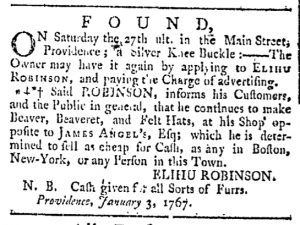What was advertised in a colonial American newspaper 250 years ago this week?

“FOUND … a Silver Knee Buckle.”
Lost and found notices frequently appeared in eighteenth-century newspapers. Colonists not only purchased consumer goods; they sometimes misplaced their possessions and placed advertisements in hopes of reclaiming them. Colonists who found lost items also sometimes helped to reunite them with their owners. Such was the case in today’s advertisement: Elihu Robinson announced that he had “FOUND” a silver knee buckle “in the Main Street, Providence,” a week earlier on December 27. He wanted to return it to its owner, but only once the owner paid “the Charge of advertising.”
That would have been the extent of most lost and found notices, but Robinson opted to add a few lines about the business he operated. He reminded former customers “and the Public in general” that he made “Beaver, Beaveret, and Felt Hats” at his shop. In the process, he incorporated an appeal to price, stating that he was “determined to sell as cheap for Cash, as any in Boston, New-York, or any Person in this Town.” In so doing, he followed a recent trend in advertisements published in the Providence Gazette by expressing concern that too many local consumers purchased their goods from shopkeepers, artisans, and suppliers in other urban ports in the region, especially the larger and more bustling cities of Boston and New York. In another advertisement in the same issue, shopkeeper James Green pledged that he sold his merchandise “at as low a rate as can be bought in this town, or any of the neighbouring governments.” More so than in any other colony, advertisers in Rhode Island encouraged prospective customers to shop locally.
Robinson’s advertisement may appear disjointed at first glance. The headline in a larger font, “FOUND,” described a silver knee buckle, but most of the advertisement promoted the hats Robinson made and sold at his shop and promises about low prices. Although seemingly unrelated, the lost-and-found notice served an important purpose. Robinson signaled to customers that they could trust his claims about offering lower prices than anywhere else in Providence or other cities because he was such an honest man that he attempted to return a silver knee buckle that he found in the street to its rightful owner. Many eighteenth-century advertisers assured readers about the quality of their character. Elihu Robinson provided a practical demonstration. Customers could trust him.
